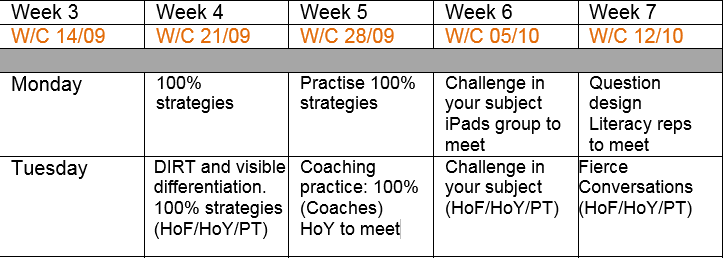A couple of weeks ago I wrote about how we practised classroom routines at DKA in order to ensure consistency. With similar behaviours and routines used across the school, it is just much easier to teach. Does this mean that everyone is expected to teach in an identical way, or that individual needs are not important? Of course not.
That is why the CPD programme that we have developed is not built solely around the school’s development needs, but with the individual teacher in mind. It is incredibly difficult to make CPD highly personalised, but I believe that we have a system that works, where every single teacher in the school gets the specific personal development that they need. Here’s what we do.
Low stakes coaching observations
This is the most important professional development that happens in our school. Every teacher-from the principal to the cover supervisor- has a weekly coaching observation which is followed up by a coaching meeting. Each probably lasts for about 15 minutes. The idea is to focus on just one small feature which can have a large impact. Paul Bambrick-Santoyo writes about this in Leverage Leadership:
No single small step will dramatically change a classroom in and of itself. Multiple small changes, though, implemented week after week, add up to extraordinary change.
The low stakes, supportive nature of this is crucial in it being used as a development tool- nobody needs to worry about judgement or grading. Coaching meetings will often include some practice, so improvements can be embedded.
Emma Hickey, head of MFL at Dixons Kings Academy, has written about the benefits of coaching here and Harry Fletcher-Wood has an excellent series of posts which explore leverage observations at length.
Differentiated CPD sessions
In addition to coaching, we still have a version of what you might call ‘traditional’ CPD. The traditional model is not particularly effective, because delivering the same training to all staff can mean that nobody really gets exactly what they need, so in our CPD model every member of staff participates in one CPD session per week, but not everyone is in the same one. Tuesday is for heads of department, heads of year and principal teachers, and often has a focus on the leadership of teaching and learning in the school. The other session, for the rest of the teaching staff, is on a Monday. The CPD will often focus on the same topic but from slightly different perspectives. Here is an extract from our plan:
 Of course, just because someone is a head of department, it doesn’t mean that they don’t need to focus on improving teaching too. And just because someone isn’t in a leadership position, it doesn’t mean that they are less experienced. So, even within this model, we need to be conscious of the fact that there are wide differences between teachers. This is why we will have more than one session every Monday and many Tuesdays. These sessions will be created based on what we learn from staff voice, coaching etc as the term goes on. We also have induction sessions for new staff and weekly Teach First sessions, plus meetings of steering groups such as department literacy reps in the example above.
Of course, just because someone is a head of department, it doesn’t mean that they don’t need to focus on improving teaching too. And just because someone isn’t in a leadership position, it doesn’t mean that they are less experienced. So, even within this model, we need to be conscious of the fact that there are wide differences between teachers. This is why we will have more than one session every Monday and many Tuesdays. These sessions will be created based on what we learn from staff voice, coaching etc as the term goes on. We also have induction sessions for new staff and weekly Teach First sessions, plus meetings of steering groups such as department literacy reps in the example above.
CPD session design
Having noted all of this, it is still difficult- if not impossible- to pitch a session just right so that everyone gets exactly what they need. You could have just two people in a session and not be able to pitch it right. That’s why we always ask- what’s in it for everyone? One of the best ways that this can be done is to allow staff to reflect, to plan, and to consider what they will do for their own classes. For example, this week we looked at some strategies to help with behaviour management. Time was given for staff to plan exactly which strategies would work best with particular students, even scripting what they might say to specific students to get them back on track. The previous week, after a brief presentation on differentiation and feedback, teachers were given most of the session to plan. (They were also able to leave if they wanted to work elsewhere.) This means that teachers are getting something which directly impacts on their classes.
Subject pedagogy
We have also increased the number of departmental meetings so teachers can focus on improving their pedagogical content knowledge. The Sutton Trust ‘What Makes Great Teaching’ report said that “the most effective teachers have deep knowledge of the subjects they teach”, and we place high value on teachers getting better at teaching their subject. While it is useful to improve in more general aspects of teaching, we can’t do a whole staff training session on how best to teach Shakespeare, which is what an English teacher might need. (Well, I will if the principal lets me). In this post on subject-specific practice, I wrote about how MFL used their meeting to practice speaking in the target language.
It isn’t easy to get CPD right for everyone, and we won’t always manage it, but the pace of improvement when you build a school culture around individual teacher development is incredible.